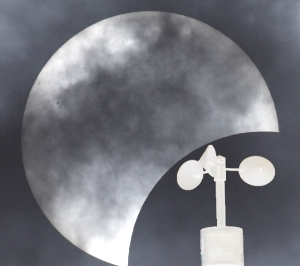New evidence to solve the mystery of the 'eclipse wind'
Release Date 15 March 2012

Solar eclipses are not only amazing celestial spectacles - they also cause subtle changes to the weather here on Planet Earth, according to meteorologists.
Scientists at the University of Reading have found new evidence that the last full solar eclipse to pass across the UK caused changes to the wind speed and direction, giving credence to the mysterious 'eclipse wind' reported anecdotally by some eclipse watchers.
Thousands of people flocked to Devon and Cornwall - the 'zone of totality' in the UK - for the eclipse on 11 August 1999, while millions more across the country witnessed a near-total eclipse.
But while the view in the South West was obscured by cloud cover, some onlookers reported feeling an eerie change of wind direction as the sun was temporarily blotted out, in a giant natural atmospheric experiment.
Researchers in the Department of Meteorology at the University of Reading, Dr Suzanne Gray, Senior Lecturer in Weather Systems, and Professor Giles Harrison, Professor of Atmospheric Physics, made use of recent advances in computer modelling power, combined with detailed meteorological measurements from across the UK on the day of the eclipse, to see how the moon's shadow changed the UK weather pattern.
"Although eclipses are known to cause temperature changes, any wind effects have been less clear," Dr Gray said. "This new approach demonstrates regional wind speed and direction changes within the southern UK, which may explain anecdotal reports of a mysterious 'eclipse wind'."
Professor Harrison said: "We've been able to demonstrate that subtle changes in the winds really did occur in 1999 associated with the post-eclipse cooling. Our new approach works by comparing the latest high definition weather model predictions for the same day without an eclipse with the observations actually obtained at many UK measurement sites."
The pair's findings, which are published this week in the journal Proceedings of the Royal Society A, add new information to an earlier analysis published by Professor Harrison in 2002. The previous work only made measurements at two sites, whereas the latest results make full use of data from 121 sites across the UK. This extra data, compared with output from new, powerful super-computers running a complex weather forecast model, has given a much clearer regional picture of how the eclipse affected the weather on the day. Weather predictions have become more sophisticated during the past decade, helping weather forecasts to become more accurate, the researchers said.
"This level of model detail was just not available in 1999, and reflects the subsequent major advances made in weather forecasting since then," Professor Harrison said.
Dr Gray added: "Importantly, the detection of the eclipse wind from such a fine scale comparison adds to our confidence in the accuracy of the latest weather forecast models."
A total eclipse like that of 1999 will not be repeated in mainland Britain until 2090.
Ends
For more details, or interview requests, please contact Pete Castle at the University of Reading press office on 0118 378 7391 or p.castle@reading.ac.uk.
Notes for editors
The researchers' paper, S. L. Gray and R. G. Harrison (2012), 'Diagnosing eclipse-induced wind changes', is published online in Proceedings of the Royal Society A.
The Department of Meteorology at the University of Reading is internationally renowned for its excellent teaching and research in atmospheric, oceanic and climate science. Established in 1965, it is the only UK university offering a full range of undergraduate and postgraduate courses in meteorology. In the 2008 Research Assessment Exercise, 75% of the Department's research was graded as world leading or internationally excellent.
The University of Reading is one of the top 1% of universities in the world (THE World University Rankings 2011-12) and is among the top 20 universities in the UK for research funding.